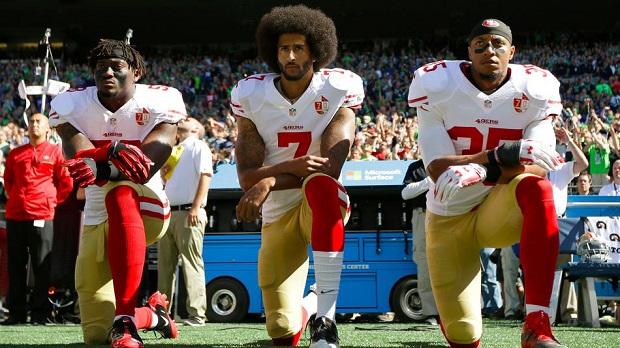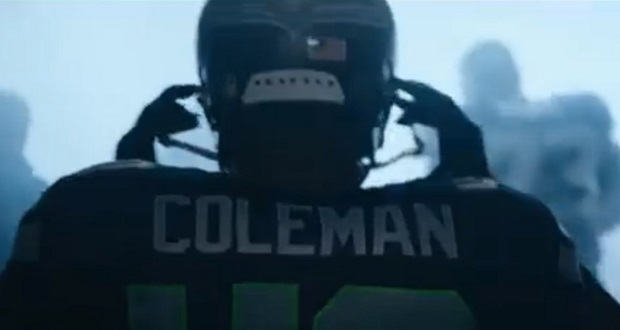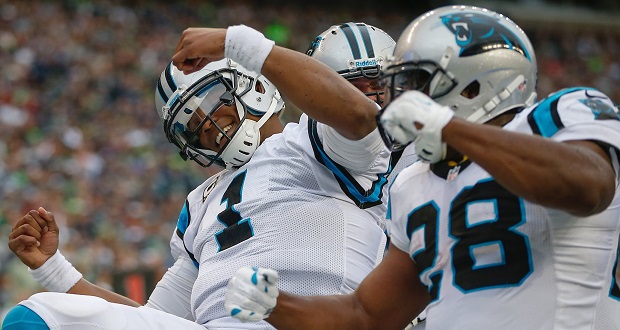
Football has seemingly eclipsed baseball as America’s pastime. What is more American than burgers, barbequed ribs, Buffalo wings, a cold beer and football while lounging in front of a big screen TV on a Sunday afternoon? With this national ritual in mind, perhaps it makes sense that Colin Kaepernick’s passionate refusal to stand for the national anthem, another national ceremony, has offended the sensibilities of “loyal” Americans. Although Kaepernick has explained that his protest was not intended to disrespect the military but to call attention to American inequality, specifically unarmed black men dying at the hands of police, some still only focus on his manner of protest and not his actual message. He clarifies that the police currently, but also historically, have been beyond reproach in regards to acts of brutality perpetrated against black citizens.
The juxtaposition of how some Americans view him is fascinating. He has been characterized as a spoiled, self-righteous, rich and arrogant athlete. Some view him as brave, admirable, self-deprecating and wise, because he provides a voice to those who are unable to speak for themselves. Still others agree with his choice to protest against police brutality but disagree with his method. He’s been described as the most hated man in the NFL, but Kaepernick’s appeal is also widespread. According to nflshop.com, which provides data on the sales of NFL paraphernalia, Kaepernick has the second highest selling jersey in the NFL.
In recent weeks, I have heard people say he is essentially spitting on the grave of my grandfather who died “defending” “our” freedom. I understand that military families are proud of their family members who have served the nation and they should be. I have also heard others say he is too rich to protest, and because of that, his protest is not authentic. This rationale has left me somewhat perplexed. Muhammad Ali made more money than most black men during his era, yet he used his platform to take a stand and speak for those without a voice. Similarly, during his protest of the Vietnam War, Ali was vilified. Ultimately, Ali was stripped of his heavyweight title and lost three years of boxing eligibility resulting from a ban imposed by the New York State Athletic Commission and the World Boxing Association.
Personally, I believe it is admirable that men are willing to sacrifice earnings, endorsements and popularity in order to bring attention to the plight of others. For religious folks it is like the Apostle Paul giving up his social position as a Pharisee to follow Jesus and be ridiculed, or Dr. Martin Luther King Jr. forsaking his academic pedigree and position in the pulpit to live in tenement buildings in Chicago and march with laypeople in Alabama to protest economic, social and political injustice. These men all used their platform to improve the quality of life for others while being cognizant that society would despise and possibly kill them. Since so much of the Kaepernick discussion revolves around the salience of race, military service, citizenship and money, I decided to explore those exact issues through my own perspective as a black male.
As Colin Kaepernick has sat and kneeled through week eight of the NFL season, his protest has spread to other sports, colleges and high schools. I am thankful that he has brought attention to a racialized political issue that has long needed to be addressed. Police brutality against black Americans is not a new issue; in fact, it has existed for a long time but with the widespread usage of social media and access to smartphones with video recorders, these cases are not so easily swept under the rug. Instead, these incidents become viral within milliseconds and accessible to anyone with internet access. My grandparents individually fled Oklahoma and Louisiana in the face of brutal and virulent racial oppression sanctioned and committed by the police. They relocated to California in search of a better life for themselves and their families. My uncles and father also relayed stories of police brutality, and one of my uncles was choked to death unarmed while in police custody in Oakland, California. I have been stopped and released by police many times without receiving a citation. Michelle Alexander, author of The New Jim Crow calls these stops, “pretext stops,” which is a racially motivated traffic stop to search “for drugs in the absence of any evidence of illegal drug activity.”
To many Americans, however, the circumstances or facts associated with cases of unarmed black men being stopped or brutalized by the police are dubious. Was force justifiable? Were the men criminals? Did they have records, where they armed? The list goes on. Police have a tough job. The men should have just complied. The phone looked like a gun. The kid appeared to be an adult. The teenager had superhuman strength. A fist is like a weapon.
Once again, I am thankful for Kaepernick’s action, because he has brought attention to a racial issue that reemerges every couple of months in America. Since police brutality in the eyes of many Americans is debatable, I decided to explore some racial topics that are not debatable but relevant to Kaepernick’s protest. Both of my grandfathers and one of my great uncles served in the Army during the Korean War and World War II. Another uncle served in Vietnam, and another served in the Navy during the Cold War. All of them are proud black men who were loyal to America. Despite their loyalty to their country of birth, when they returned to America, they returned to a segregated society as second class citizens, solely because of their skin color. They were systematically discriminated against. They were redlined: denied housing loans and encountered de jure and de facto segregation. Some were even attacked upon return; ironically and sadly, my uncle who served in Vietnam “protecting” “our” rights was the same uncle killed in police custody. Black civil rights were not won on the battlefield but through civil disobedience. Could history be repeating itself? When Dr. King fought for Civil Rights he was criticized, jailed and ultimately killed. Today, we view King’s stance as unmistakably spot-on, however, he was not always viewed in such a positive or widely accepted light.
There are countless other paradoxes concerning our country’s history pertaining to war and citizenship. After World War II, there were numerous German POWs living in the Midwest, South and Southwest. These enemy soldiers were granted more rights and access in American society than black Soldiers. Imagine that, Nazi Germans with more rights than Americans in the United States. As black Americans, we exist inside a deep tension where we see and experience the blatant hypocrisy of America, but also aspire to the grandeur and possibility associated with The American Dream. We, as a people, have been oppressed but we have fought and never accepted that position, accomplishing a great deal socially, economically and politically. Society has changed and progress has been made in the direction of equality but equity has not been achieved.


















